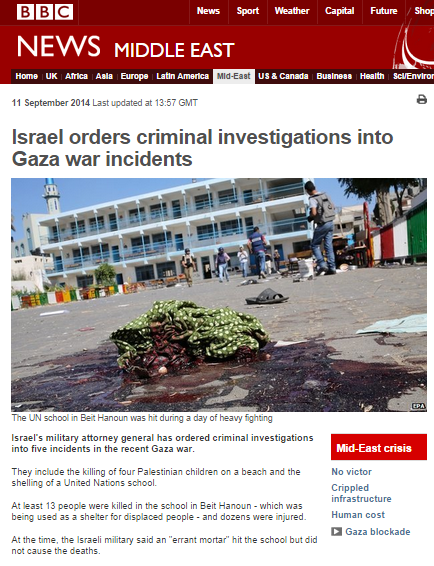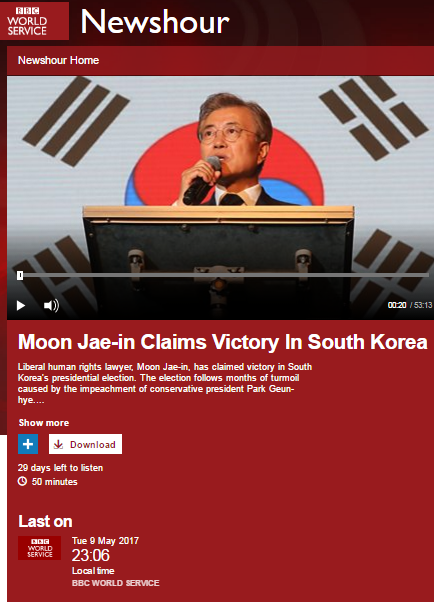The first part of the opening report in Tim Franks’ currently ongoing series of features on Israel which was broadcast on the BBC World Service radio programme ‘Newshour’ on January 30th (from 30:12 here) was discussed in a previous post.
Following his visit to Givat HaMatos with the founder of the political NGOs Ir Amim and Terrestrial Jerusalem, Daniel Seidemann, Franks went on to present a view of the topic of the proposed relocation of the US embassy to Jerusalem which conforms to the framing of that topic seen in all BBC content to date.
That framing fails to inform audiences why there should be objection to the relocation of the embassy to an area of Jerusalem to which the BBC repeatedly tells its audiences the PA does not lay claim. In addition, Franks amplified Seidemann’s view of the issue, which is strikingly similar to that expressed by Palestinian officials.
Franks: “There’s some other building work in Jerusalem which, if it went ahead, would be controversial. Danny Seidemann puts it rather more strongly. He says it would be destabilising, dangerous and a death certificate for America’s role as a mediator. And that would be moving the US embassy here. No other country has their embassy in Jerusalem because under the UN resolution which paved the way for the establishment of a Jewish homeland and an Arab homeland seventy years ago, the status of Jerusalem was left unresolved.”
Franks clearly misled listeners here: UN GA resolution 181 was non-binding and no more than a recommendation – the implementation of which depended upon the agreement of the parties concerned. As is well known, the Arab nations rejected the Partition Plan en masse and even threatened to use force to oppose it. The recommendation hence became a non-starter and its various clauses – including the Jerusalem corpus separatum proposal – irrelevant. Franks’ inaccurate portrayal of that resolution will come as no surprise to those familiar with the BBC’s serial misrepresentation of the topic. He continued:
Franks: “But the Trump administration and the man it wants here as its ambassador have strongly signalled that they want to move the embassy here from Tel Aviv and it might well – if it does move – come to this big purpose-built building I’m standing next to: the US Consulate. For those in the governing Likud party, moving the US embassy here would be a great coup.”
Listeners were not informed that the US Consulate is located on the Israeli side of the 1949 Armistice Agreement lines. Audiences then heard a conversation between Franks and an Israeli MK in which Franks further promoted without question the notion that building houses in Givat HaMatos would prevent a two-state solution.
Franks: “Among those sensing a change in the weather are members of this place: the Knesset – the Israeli parliament. Sharren Haskel is a Likud MK. She’s just back from Washington after being invited to the inauguration and she’s still outraged at the UN Security Council resolution last month condemning Israeli building on occupied territory.”
Haskel: “The international community comes and says it’s working with Israel to better the future of Israel but then they come and literally they stab us in the back, saying wording like that…that Jerusalem is not our capital? That this is the barrier to peace?”
Franks: “I don’t think they said Jerusalem is not the capital of Israel.”
Haskel: “Well part of those areas that they are calling – they’re calling it the occupied territories – part of that is Jerusalem. And so the one who is actually the barrier towards peace are these declarations that come time after time, that are –you know – giving hope to the Palestinians that maybe one day the Jews will leave Jerusalem; that Jerusalem will not [no] longer be the capital of Israel. This is the barrier to peace. And for me, when the international community come and punch us in that kind of way, we can punch back. And the punch back can be 2,100 homes that are going to be built in Jerusalem, because it is our capital, and it is to have the flag of America flown on the new embassy in Jerusalem.”
Franks: “And yet the argument that is advanced by those in the Security Council and elsewhere who say that this building is a barrier to peace is that for example these new developments in East Jerusalem, they say that they cut Jerusalem off from the West Bank, from a future Palestinian state. If there were building, for example, in Givat HaMatos, that would mean Jerusalem is encircled and you couldn’t have a Palestinian state. So it’s not about the Jews being kicked out of Jerusalem but it’s about whether there is any hope of there being a separate Palestinian state alongside Israel.”
Haskel: “I’ll show you a map now of Jerusalem. You will see that it’s absolutely impossible to divide Jerusalem into a capital of two different countries. If we want to narrow this gap of hatred and violence, if we really want to create peace and co-existence, it’s very difficult by separating and creating physical borders on the field.”
Franks: “So a two-state solution; it’s fine words but it’s unrealistic, you’re saying.”
Haskel: “I’m saying any kind…you know the world is trying to picture as if there’s only one solution to the problem between the Israelis and the Palestinians. It’s not just one. It’s like this scale; like a grid that goes all the way from two states to two people to one state to two people. And then there’s many more solution on that grid too.”
Franks: “Except – I’m sorry, I’ve got to come back on you because as far as much of the rest of the world is concerned, unless you have a separate Palestinian state, Israel cannot continue to be a Jewish and democratic country.”
Haskel: “Why?”
Franks: “Because you wouldn’t be affording the Palestinians, whom you are currently ruling over, full rights.”
With that statement Franks erases from audience view the fact that for more than two decades the majority of Palestinians in Judea & Samaria have in fact lived under Palestinian Authority rule, with “full rights” to vote in PA elections and that those located in the Gaza Strip have not been under Israeli ‘rule’ for well over a decade.
Haskel: “Well this is just your idea. It’s your idea how you picture one state if that’s happen. It can be with an Israeli citizenship to everybody. How does that contradict democracy?”
Franks: “But then you wouldn’t be able to ensure that there would be continued Jewish majority rule if it was citizenship for everybody because the demography is against you.”
Haskel: “Well that’s not true. But more than that, you know the reality that we will choose to live in, this is our decision. This is a decision that we will need to live and die by. So what I would say to the international community is just give us a little bit of credit that we know how to run our life. We know how to be the only democracy in the Middle East and we know how to maintain that.”
The item then turned to a conversation between Franks and programme presenter Razia Iqbal.
Iqbal: “Likud member of the Knesset Sharren Haskel. Eh…Tim, the Prime Minister Benjamin Netanyahu has shown himself to be a tenacious politician. How strong a position is he in now given that he’s facing some serious corruption allegations?”
Franks: “Well the police have interviewed Mr Netanyahu several times, most recently at the end of last week, about these allegations. Ahm…allegations that he for example took gifts like more than $100,000 worth of cigars and pink champagne, apparently, possibly in return for asking the Americans to fast-track a visa for a businessman friend. There’s also been allegations that the publisher of a newspaper – it’s one of Israel’s big newspapers called Yediot Ahronot – ahm…he was asked to give more favourable coverage in return for new rules and the government reining in a free sheet called Israel HaYom which is very pro-Netanyahu and whose distribution – ‘cos it’s a free sheet – has been killing the newspapers which charge.
The legal system here is very strong and very independent. Other top politicians have gone to jail in the past but Mr Netanyahu is not a quitter and there doesn’t appear to be any great appetite in parliament or in his party or among coalition partners to bring him down. That said, the view is that all this pressure does make him more biddable to the Right and that’s something we’re going to be looking at later in the week. And before that, I should say, we’re heading to the place where the product of political dysfunction is at its most extreme, is most compressed, and that’s Gaza and that’s where we’ll be broadcasting from on Wednesday.”
In this very long report – over twelve and a half minutes – we once again see the BBC pushing a political narrative which frames the PLO’s interpretation of the two-state solution as the sole option. Yet again we see that the BBC steers audiences towards the view that the two-state solution is endangered by Israeli actions, while concealing no less relevant issues such as Palestinian terrorism, Palestinian Authority incitement, Hamas’ refusal to accept the two-state solution, the PA’s refusal to recognise Israel as the Jewish state and the Hamas-Fatah split.
While those editorial policies certainly advance the corporation’s chosen narrative on the issue of the peace process, they obviously do not contribute to meeting the BBC’s remit of building “global understanding” concerning the range of factors preventing the two-state solution from becoming reality.
Related Articles:
Another BBC WS ‘Newshour’ Israel special – part one




